.svg.png.webp)
The location of the state of Alaska in relation to the rest of the United States of America
The following outline is provided as an overview of and topical guide to the U.S. state of Alaska:
Alaska – most extensive, northernmost, westernmost, highest, second newest, and least densely populated of the 50 states of the United States of America. Alaska occupies the westernmost extent of the Americas, bordering British Columbia and the Yukon, and is detached from the other 49 states. The summit of Denali (formerly Mount McKinley) at 6,194 meters (20,308 feet) is the highest point of North America.
General reference
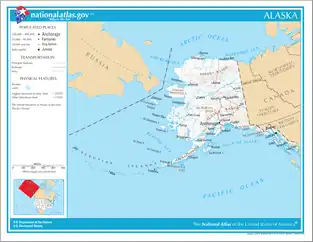
An enlargeable map of the state of Alaska
- Names
- Common name: Alaska
- Pronunciation: /əˈlæskə/ ⓘ
- Official name: State of Alaska
- Abbreviations and name codes
- Postal symbol: AK
- ISO 3166-2 code: US-AK
- Internet second-level domain: .ak.us
- Nicknames
- Great Land (previously used on license plates)
- Land of the Midnight Sun[1]
- The Last Frontier (presently used on license plates)[1][2]
- Seward's Folly (named after U.S. Secretary of State William H. Seward)[1]
- Seward's Ice Box, Icebergia, Polaria, Walrussia, and Johnson's Polar Bear Garden were satirical names coined by members of the U.S. Congress during debate over the Alaska Purchase[1]
- Common name: Alaska
- Adjectivals
- Demonym: Alaskan
Geography of Alaska
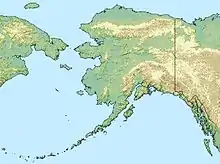
An enlargeable topographical map of the state of Alaska
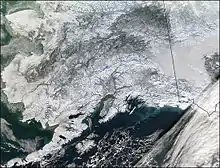
A satellite photo of Alaska during winter.
- Alaska is: a U.S. state, a federal state of the United States of America
- Location: westernmost North America
- Population of Alaska: 710,231 (2010 U.S. Census[3])
- Area of Alaska:
- Atlas of Alaska
Places in Alaska
- Historic places in Alaska
- National Natural Landmarks in Alaska
- National parks in Alaska – see also List of areas in the United States National Park System.
- State parks in Alaska
Environment of Alaska
- Climate of Alaska
- Protected areas in Alaska
- Superfund sites in Alaska
- Wildlife of Alaska
- Fauna of Alaska
Geographic features of Alaska
Man-made geographic features of Alaska
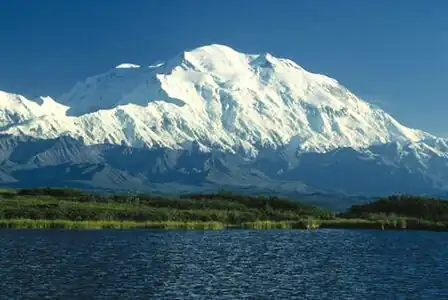
Denali in Alaska is the highest mountain peak of the United States of America and all of North America. Denali is the third most topographically prominent summit on Earth after Mount Everest and Aconcagua.
Natural geographic features of Alaska
Regions of Alaska
- Alaska Interior
- Alaska North Slope
- Alaska Panhandle
- Arctic Alaska
- Kenai Peninsula
- Matanuska-Susitna Valley
- Seward Peninsula
- Southcentral Alaska
- Southwest Alaska
- Tanana Valley
- The Bush
- Yukon-Kuskokwim Delta
Administrative divisions of Alaska
- Boroughs and census areas of the state of Alaska
- Municipalities in Alaska
- Cities in Alaska
- State capital of Alaska: Juneau
- Largest city in Alaska: Anchorage (66th largest city in the United States)
- City nicknames in Alaska
- Native tribal entities
- Towns in Alaska
- Cities in Alaska
- Municipalities in Alaska
Boroughs of Alaska
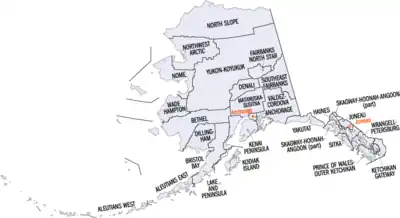
An enlargeable map of the boroughs and census areas of the state of Alaska
- Aleutians East Borough
- Anchorage
- Borough
- Bristol Bay Borough
- Fairbanks North Star Borough
- Haines Borough
- Juneau
- Kenai Peninsula Borough
- Ketchikan Gateway Borough
- Kodiak Island Borough
- Lake and Peninsula Borough
- Matanuska-Susitna Borough
- North Slope Borough
- Northwest Arctic Borough
- Sitka Borough
- Skagway Borough
- Unorganized Borough
- Wrangell
- Yakutat City and Borough
Demography of Alaska
Government and politics of Alaska
- Form of government: U.S. state government
- United States congressional delegations from Alaska
- Alaska State Capitol
- Elections in Alaska
- Legal status of Alaska
- Political party strength in Alaska
- Political scandals
Branches of the government of Alaska
Executive branch of the government of Alaska
- Governor of Alaska
- State departments
- Alaska Department of Commerce, Community and Economic Development
- Alaska Department of Corrections
- Alaska Department of Health and Social Services
- Alaska Division of Juvenile Justice
- Alaska Permanent Fund
- Alaska Volcano Observatory
- Alaska Department of Education & Early Development
- Alaska Department of Fish and Game
- Alaska Department of Natural Resources
- Alaska Department of Transportation & Public Facilities
- Alaska Oil and Gas Conservation Commission
- Alaska State Medical Board
- Alaska State Pension Investment Board
Legislative branch of the government of Alaska
Judicial branch of the government of Alaska
Law and order in Alaska
- Cannabis in Alaska
- Capital punishment in Alaska: none. Alaska abolished the death penalty prior to statehood, eight men were executed by the earlier territorial government (1900–1959) and even earlier "Miner's Courts" executed a number of men in the 19th century.[4] See also Capital punishment in the United States; William Fentress Thompson and "Jerked to Jesus" (in regard to capital punishment and the early history of Fairbanks).
- Constitution of Alaska
- Crime in Alaska
- Gun laws in Alaska
- Law enforcement in Alaska
- Law enforcement agencies in Alaska
- Penal system in Alaska
- Same-sex marriage in Alaska
Military in Alaska
Local government in Alaska
History of Alaska
History of Alaska, by period
- Prehistory of Alaska
- Russian Alaska, 1741 – 1867
- Great Northern Expedition, 1733 – 1743
- Spanish expeditions to Alaska, 1744 – 1791
- U.S. Department of Alaska, 1867 – 1884
- Alaska Purchase, treaty signed on March 30, 1867
- Gold mining in Alaska
- Klondike Gold Rush, 1896 – 1899
- Alaska boundary dispute, 1896 – 1903
- District of Alaska, 1884 – 1912
- Hay-Herbert Treaty, arbitration committee resolution occurred October 20, 1903
- Territory of Alaska, 1912 – 1959
- World War I, June 28, 1914 – November 11, 1918
- United States enters Great War on April 6, 1917
- Mount McKinley National Park established on February 26, 1917
- Serum run to Nome, January 26 - February 15, 1925
- World War II, September 1, 1939 – September 2, 1945
- Alaska World War II Army Airfields
- Alaska Defense Command established February 4, 1941
- United States enters Second World War on December 8, 1941
- Aleutian Islands Campaign, June 3, 1942 – August 15, 1943
- Alaska Highway completed 1942
- Alaskan Air Command established December 18, 1945
- Operation Washtub (United States), active 1951-1959
- World War I, June 28, 1914 – November 11, 1918
- State of Alaska becomes 49th state admitted to the United States of America on January 3, 1959
- Arctic National Wildlife Refuge established on December 6, 1960
- Good Friday earthquake of 1964
- Prudhoe Bay oil field discovered 1968
- Alaska Native Claims Settlement Act of 1971
- Trans-Alaska Pipeline System completed 1977
- Arctic National Wildlife Refuge drilling controversy since 1977
- Mount McKinley National Park incorporated into Denali National Park and Preserve on December 2, 1980
- Gates of the Arctic National Park and Preserve established on December 2, 1980
- Glacier Bay National Park and Preserve established on December 2, 1980
- Katmai National Park and Preserve established on December 2, 1980
- Kenai Fjords National Park established on December 2, 1980
- Kobuk Valley National Park established on December 2, 1980
- Lake Clark National Park and Preserve established on December 2, 1980
- Wrangell-Saint Elias National Park and Preserve established on December 2, 1980
- Arctic National Wildlife Refuge expanded on December 2, 1980
- Exxon Valdez oil spill of 1989
History of Alaska, by region
History of Alaska, by subject
Culture of Alaska
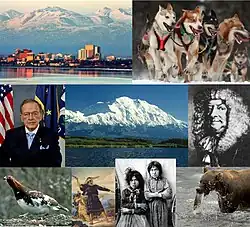
clockwise from top left, Anchorage, sled dogs, Vitus Bering, brown bear with salmon, two Tlingit girls, an Aleut man, willow ptarmigan, Senator Ted Stevens, Denali (center)
- Casinos in Alaska
- Hunting and fishing in Alaska
- Gardening in Alaska
- Museums in Alaska
- People of Alaska
- Religion in Alaska
- Scouting in Alaska
The arts in Alaska
- Alaska Native art
- Cinema in Alaska
- Music of Alaska
Sports in Alaska
State symbols of Alaska
- State insignia
- Flag of the State of Alaska

- Seal of the State of Alaska

- State motto: "North to the Future"
- Flag of the State of Alaska
- State bird: Willow ptarmigan, adopted by the Territorial Legislature in 1955. It is a small (15–17 inches) Arctic grouse that lives among willows and on open tundra and muskeg. Plumage is brown in summer, changing to white in winter. The willow ptarmigan is common in much of Alaska.
- State fish: King salmon, adopted 1962.
- State flower: Wild/native forget-me-not, adopted by the Territorial Legislature in 1917.[5] It is a perennial that is found throughout Alaska, from Hyder to the Arctic Coast, and west to the Aleutians.
- State fossil: Woolly mammoth, adopted 1986.
- State gem: Jade, adopted 1968.
- State insect: Four-spot skimmer dragonfly, adopted 1995.
- State land mammal: Moose, adopted 1998.
- State marine mammal: Bowhead whale, adopted 1983.
- State mineral: Gold, adopted 1968.
- State song: "Alaska's Flag"
- State sport: Dog mushing, adopted 1972.
- State tree: Sitka spruce, adopted 1962.
- State dog: Alaskan Malamute, adopted 2010.[6]
- State soil: Tanana,[7] adopted unknown.
Economy and infrastructure of Alaska
- Aquaculture in Alaska
- Commercial fishing in Alaska
- Communications in Alaska
- Energy in Alaska
- Companies of Alaska
- Gold mining in Alaska
- Health care in Alaska
Transportation in Alaska
- Government agencies
- Modes of transportation in Alaska
- Air transport in Alaska
- Airlines in Alaska
- Airports in Alaska – major airports include:
- Bush flying in Alaska
- Marine transport in Alaska
- Bus travel in Alaska
- Areas operating local bus service[8]
- Anchorage: People Mover
- Bethel
- Fairbanks: Metropolitan Area Commuter System
- Juneau: Capital Transit System
- Kenai
- Ketchikan
- Sitka – the Sitka Tribe of Alaska offers public bus transit in conjunction with the Alaska Department of Transportation.
- Areas operating local bus service[8]
- Rail transport in Alaska
- Roads in Alaska
- Other modes of transportation in Alaska
- Mushing – transportation by dogsled.
- Off-road transportation
- Air transport in Alaska
Education in Alaska
- Schools in Alaska
- School districts in Alaska
- Higher education in Alaska
- College athletic programs in Alaska
- Colleges and universities in Alaska
- Alaska Pacific University, formerly Alaska Methodist University
- Sheldon Jackson College
- University of Alaska
- Legal education in Alaska
See also
- Topic overview:
- All pages with titles beginning with Alaska
- All pages with titles containing Alaska
References
- 1 2 3 4 The Last Frontier State, 50 States, retrieved April 24, 2009.
- ↑ Alaska Division of Economic Development (2010-12-21). "Alaska Division of Economic Development". Alaska Division of Economic Development. Retrieved 2011-07-30.
- ↑ "U.S. Census Bureau State & County QuickFacts". Archived from the original on 2010-05-27. Retrieved 2011-11-18.
- ↑ Green, Melissa S. (September 21, 2001) [July 20, 2001]. "A History of the Death Penalty in Alaska". University of Alaska Anchorage. Archived from the original on June 5, 2010. Retrieved July 15, 2010.
Alaska as a state has never had a death penalty. However, in Alaska's territorial days, eight men were executed under civil authority between 1900 and 1957. Other persons in Alaska were executed extrajudicially in the late 19th century under so-called "miner's laws." There is currently no easily available information on executions that may have taken place under military authority in Alaska.
- ↑ "Alaska Conservation Foundation – State Symbols". Archived from the original on 2009-02-25.
- ↑ "It's official: Malamute now Alaska's state dog – KTUU.com | Alaska's news and information source |". KTUU.com. 2010-05-12. Retrieved 2010-06-02.
- ↑ Tanana – Alaska State Soil U.S. Department of Agriculture
- ↑ "Transit: Grants - Transportation & Public Facilities, State of Alaska". Archived from the original on 2010-06-11. Retrieved 2011-11-20.
External links
 Wikimedia Atlas of Alaska
Wikimedia Atlas of Alaska- Alaska Community Database System
- Alaska's Digital Archives
- Alaska, project area of the American Land Conservancy
- Alaska Inter-Tribal Council
- Outline of Alaska at Curlie
- Big, Beautiful Alaska – slideshow by Life magazine
- U.S. Government
- Energy & Environmental Data for Alaska
- USGS real-time, geographic, and other scientific resources of Alaska
- US Census Bureau
- Alaska State Facts
- Documents on Alaskan Statehood at the Dwight D. Eisenhower Presidential Library
- Guide to collections containing information on Alaskan statehood at the Eisenhower Presidential Library
- State government
- State of Alaska website
- Alaska State Databases – Annotated list of searchable databases produced by Alaska state agencies and compiled by the Government Documents Roundtable of the American Library Association.
- Alaska Department of Natural Resources, Recorder's Office
This article is issued from Wikipedia. The text is licensed under Creative Commons - Attribution - Sharealike. Additional terms may apply for the media files.